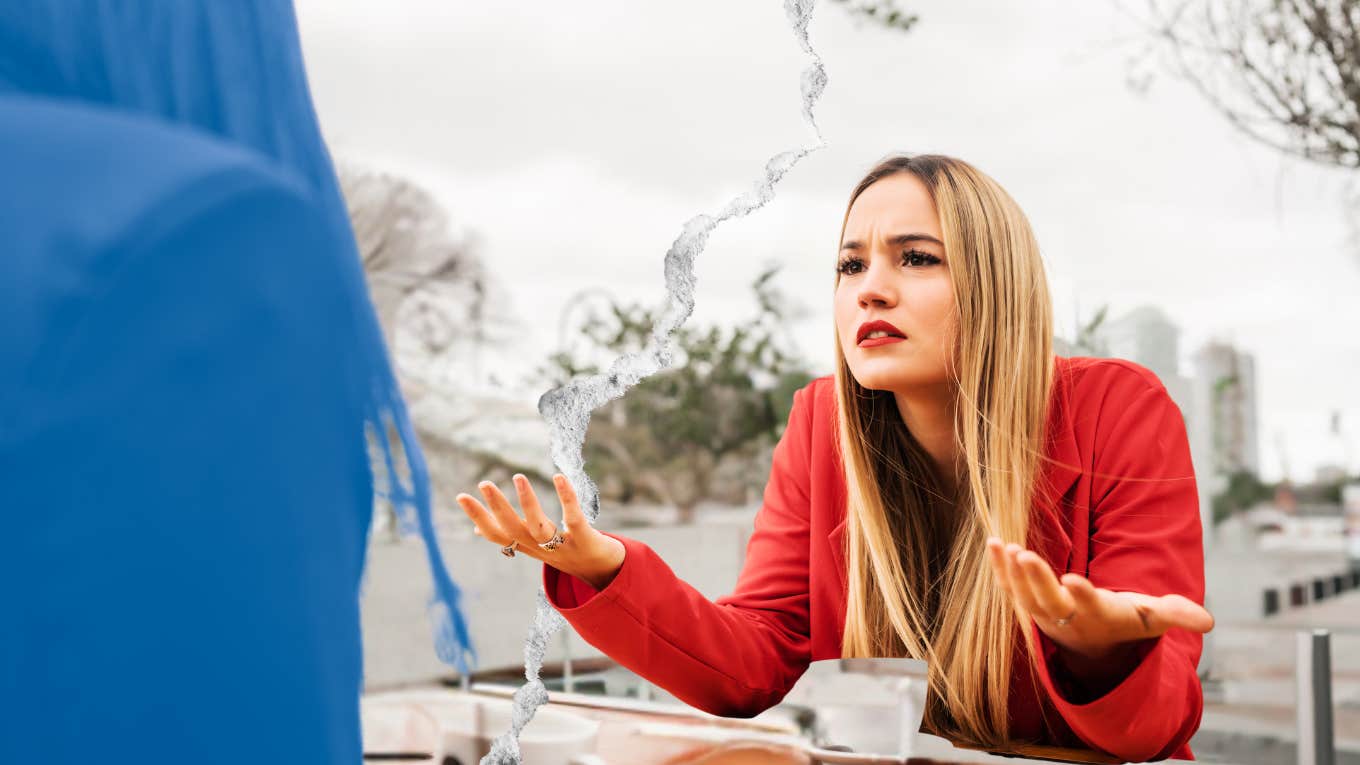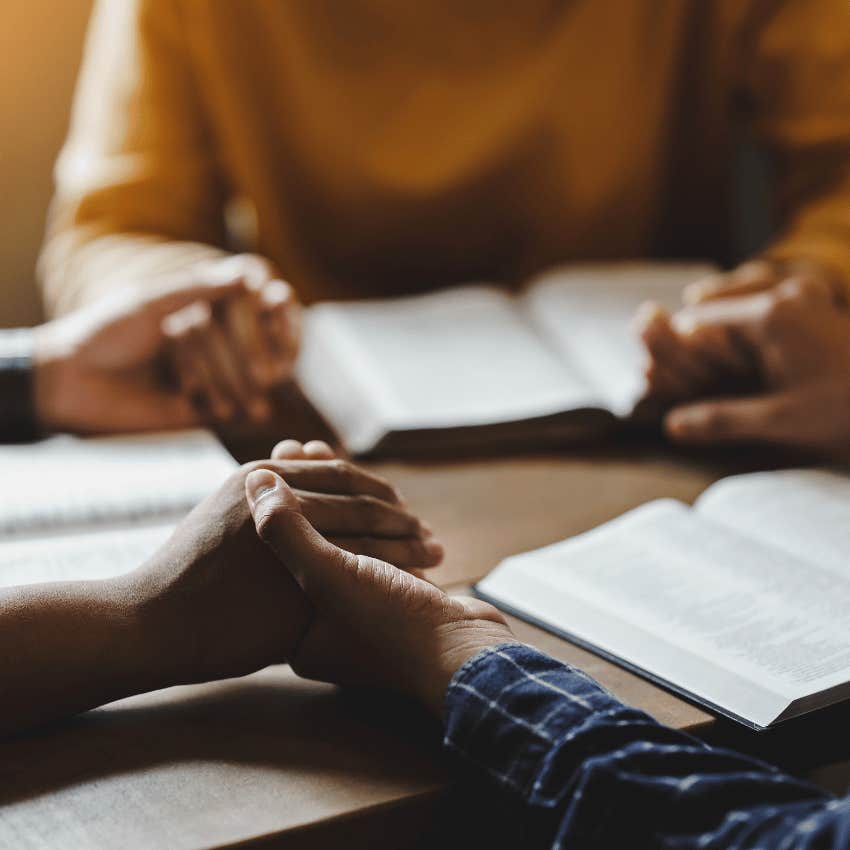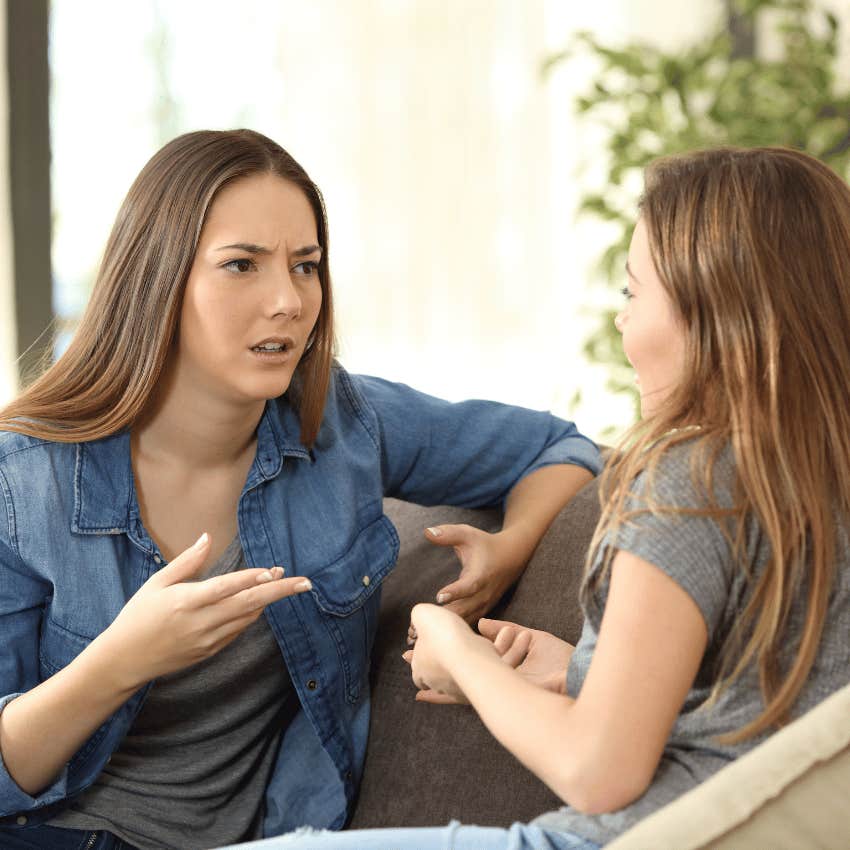I Lost My Friend To The Great Political Divide — 'Her Hostility Floored Me'
I didn't expect religion and politics to come between us, until they did.
 nicomenijes | Canva
nicomenijes | Canva It was Julia who rescued me that night on the karaoke stage. While I operate under no illusions that I can sing, I thought I could do a passable rendition of Red Hot Chili Peppers’ “Under the Bridge.” I knew the whole thing by heart, having frequently belted it out during my angsty middle school years and, more recently while driving with my children.
I started not just off-key but very off-key. I could hear how atrociously off the key was, but I had no idea how to fix it. I’d only had one beer and was far too sober to be on a stage. I stood there flailing, realizing with horror how friggin’ long this particular song was, casting desperate looks at the karaoke DJ to see if she would be willing to put me out of my misery, along with everyone else.
Julia saw my desperation and was suddenly next to me on stage. We wailed into the mic together, each in our key, leaning into the cacophony. We sounded atrocious, but it was easier to sound atrocious — fun, almost — with Julia by my side.
A year later, Julia officially unfriended me. She unfriended all our mutual friends who had been in the karaoke room that night.
Then she announced in an Instagram story that she was pro-Trump, pro-life, pro-gun. Oh yeah, and that there were only two genders and All Lives Matter. I normally don’t get caught up in the petty drama of “unfriending,” but this one hit me hard.
The fact that “unfriend” has become a verb in my lifetime speaks to our growing willingness — eagerness, even — to carve people out of our lives. It can be as easy as the click of a button. No face-to-face arguments, conversations, or reckonings. Just… click.
Maybe it shouldn’t have been a surprise, but I was surprised all the same. Outraged, yes. But mostly sad. Very, very sad.
Julia and I had met seven years before The Unfriending at a weekly church service that our neighbors held in their living room. Neither of us, as I understood it, was all that into Jesus. I mean, we didn’t have anything against Jesus himself, but we weren’t interested in single-minded devotion. We first and foremost appreciated the opportunity to convene and break bread with neighbors.
 Deemerwha studio | Shutterstock
Deemerwha studio | Shutterstock
Julia and I were different in a lot of ways. She was born and raised in rural Montana; I hailed from the urban heart of San Francisco.
She’d gone to flight attendant school; I’d gone to an Ivy League college. She worked as a Nordstrom’s sales associate and then as a homemaker; I had a career in nonprofit marketing.
Some people might look at her demographic profile and wonder why I was surprised by her announcement on Instagram. She checks all the boxes, right? Church-going, rural, high-school educated, homemaker.
It’s easy to make assumptions from afar. But I knew Julia close up. And close-up is where shades of nuance come into focus, where rigid lines become fluid, and where barriers begin to break down.
We were both pregnant when we met, me with my second child and Julia with her first. After having our respective babies, we both found ourselves grappling with the relentlessness of early motherhood. We were embracing our new roles but also grieving the loss of our former identities.
We were devoted mothers and partners, but we also felt stifled and confined. Exhausted by the grinding procession of tasks and sometimes resentful of our husbands, who both drank too much and who seemed to operate in a parallel reality in which their own needs were still worthy of attention.
Julia thrust herself into being a full-time homemaker after realizing she would lose too much commission by having to take breaks to pump at her job. While she took care of her child, my husband was attending graduate school, and we were both struggling to live on one income. We both began sinking into credit card debt, gradually at first and then with alarming momentum, until the weight of it threatened to crush us.
Julia and I regularly indulged in cannabis to calm the chatter in our brains, and we overindulged in cocktails during our rare nights on the town. Whether singing karaoke or dancing to ’80s music at the Crystal Ballroom, we grasped at the hemlines of our former identities, remembering ever so fleetingly what it was like to move through the world without a child (or two) in tow.
Of course, we always paid dearly. We’d sometimes text each other at 6 a.m. the next morning, ripped from sleep, our ears ringing with the ceaseless demands of small children, cursing the abrupt return to our present realities.
Julia was always generous. She made things happen. She showed up. If she said she was going to be somewhere, she almost always was, and she never showed up empty-handed.
When my husband moved to San Francisco for three months for a graduate school internship, Julia and her husband organized a letter-writing campaign. Throughout his challenging three months shadowing an occupational therapist at a locked psychiatric ward, he received handwritten letters from his neighbors and friends cheering him on.
During that time, as I navigated the challenges of reconciling my work schedule with complex summer camp schedules as a solo parent, she helped out with childcare and camp pickups. Shortly before my husband’s return, she organized a group of us to make poster board signs.
At the airport, we waved our signs, hooting, and hollering, making such a ruckus that passing travelers paused to delight in the heartwarming scene of a human being returning to a community that cared about him and missed him in his absence.
Our families took day trips together, went camping, and once rented a house on the coast. She planned meals and excursions. She was the one who thought of everything, who brought the extra cooler, the knife to cut the watermelon, and the clips so that our tablecloth didn’t blow away. When my husband graduated from his doctorate program, she was the one who thought to bring window markers so we could decorate his car.
If there’s one thing I’ve come to appreciate in this world, it’s people who follow through. People who say they’re going to be somewhere and then are. Even though Julia is wispy and thin, she is one of the sturdiest, most solid people I know.
 Ground Picture | Shutterstock
Ground Picture | Shutterstock
Julia never cared much for politics or Big Ideas. She’d rather talk about the tangible, the here and now.
When we convened weekly with other women from our church for wine and treats, she’d go silent when the conversation got abstract, then light up when someone asked her advice on when to plant tomato seeds.
She kept us regularly updated on her avocado tree, which she was nurturing in her living room with single-minded perseverance. It became her life mission to grow an avocado in the Pacific Northwest.
That avocado tree reminded me a lot of Julia. Both were tall, spindly, a little out of place. But determined to bloom where they’d landed. Despite her determination, it was becoming evident that Julia wasn’t entirely happy as a homemaker — the drudgery, the isolation, and the constant battles with clutter that descended with fury on their small apartment day after day after day.
Then one day she seemed… different. Lively, exuberant almost, with a new brightness in her eyes. She announced she was starting her own business, teaching cooking classes to children. She threw herself into it with the same gusto that she had thrown herself into homemaking.
I attended every class I could, kids in tow. I could tell she was thriving from interacting with the world that lay beyond the narrow confines of her apartment, doing something that was hers and hers alone.
But soon the darkness arrived, casting her world in shadow. She couldn’t see a way forward with her business, and then she found herself overwhelmed by the unspeakable grief of miscarriage, the grief that women clench in their fists, only talk about in whispers. No funeral ceremony, no public reckoning. We shake our heads and move on.
Like almost everyone else, I didn’t know how to be there for her. Our friendship was solid but pragmatic, all playdates and potlucks. Emotional intimacy is time-consuming — the whispered confidences, the late-night giggles — and mom friendships don’t usually allow for such luxuries.
Research findings showed that friendship quality and socializing with friends predict well-being levels. In addition, the number of friends, their reactions to their friend's attempts to capitalize on positive events, support of friend's autonomy, and efforts to maintain friendship are positively correlated with well-being.
When Julia’s next pregnancy continued past the first trimester, into the second, and then the third, I threw her a baby shower, and we played stupid games in my living room while munching on charcuterie and sipping seltzer water.
I wished we were sipping margaritas and singing karaoke, but pregnancies and babies have a knack for spoiling all the fun. Meanwhile, our neighborhood church community was fraying at the edges; in a few months, it would all but dissipate.
Julia and her husband had been spending more time in the neighboring town, at a decidedly more “Jesus-y” church.
It was not held in someone’s living room and did not, to my knowledge, allow its congregation to drink IPA during service. But I understood the appeal. Earlier, its Celebrate Recovery group had helped Julia navigate a dark season in her life, and with a second baby on the way, a reliable support network was more vital than ever.
Desperate to escape the smothering confines of their apartment, she and her husband started looking to buy a condo near their new church in Gresham. My husband and I had been lucky to buy our house seven years prior, but since then, prices have soared. The heavy hand of gentrification was pressing against the city, pushing families away from the center, spreading them beyond the perimeters in a slow, sinister ooze.
I was elated for them when they found a condo, but I also knew it marked the end of a chapter and the beginning of another. I knew they would now be no more than an intermittent presence in our lives.
Maybe the occasional text check-in, the semiannual playdate, or dinner. After all, there was a big difference between a family who lived half a block away and a family who lived a hundred blocks away.
Come to think of it, I’m not sure if the avocado tree made the move, or if it ever produced an avocado. During my one visit to their new condo, I didn’t think to ask. I assumed there would be other visits, but then Covid hit and we all retreated into our separate homes. I caught up with Julia and our other neighborhood friends a few times on Zoom, and then we all got sick of Zoom, and the days and weeks started bleeding together and we all lost track of time.
 Antonio Guillem | Shutterstock
Antonio Guillem | Shutterstock
When Julia unfriended me, it’s fair to say we weren’t friends anymore.
I hadn’t seen or interacted with her for over 18 months. I could have reached out. She could have reached out. But neither of us did.
I thought we probably would at some point after the craziness of COVID-19 had passed, but I also knew that physical distance inevitably creates emotional distance. Friendships wither without the water of proximity.
There are plenty of people who have played integral roles in my life at one point or another, and then, by circumstance, fade away. There are no hard feelings. It’s nice to think about them from time to time, to know we share the same fond memories, and to wonder if our paths might cross again.
That’s how I felt about Julia — that is, until her Instagram announcement. I was not prepared for the finality of her unfriending and the vitriol of her political proclamation. It didn’t surprise me that she had drifted right, but her hostility floored me, her insistence on building walls and slamming doors.
Pro-life. Pro-Trump. Pro-gun. Two genders. All Lives Matter. Click. Unfriend.
One study's results highlight the importance of political alignment in friendship. It’s so important that, in many cases, it may be even more critical than closeness in the relationship. For some people, discovering that a close friend is a political out-group could be “a betrayal.”
Once, my Black husband had been amongst her husband’s best friends. Once, my biracial children had been her daughter’s closest playmates. Once, we had been two human families, exhausted by the demands of modern parenthood, suffocated by debt, bewildered by the lack of support.
Once, we had gathered around a campfire together and gazed up at a vast sky smeared with stars. “God’s up there,” Julia’s husband had said. “He’s looking down at all of us.”
We still share the same sky, but their God no longer looks down on all of us. Their God has shut us out, denying my children and husband their daily realities, denying all of us our shared humanity.
I don’t hold it against Julia, but I grieve for her. I grieve for us and all we have lost.
Kerala Taylor is an award-winning writer and co-owner of a worker-owned marketing agency. Her weekly stories are dedicated to interrupting notions of what it means to be a mother, woman, worker, and wife. She writes on Medium and has recently launched a Substack publication Mom, Interrupted.

